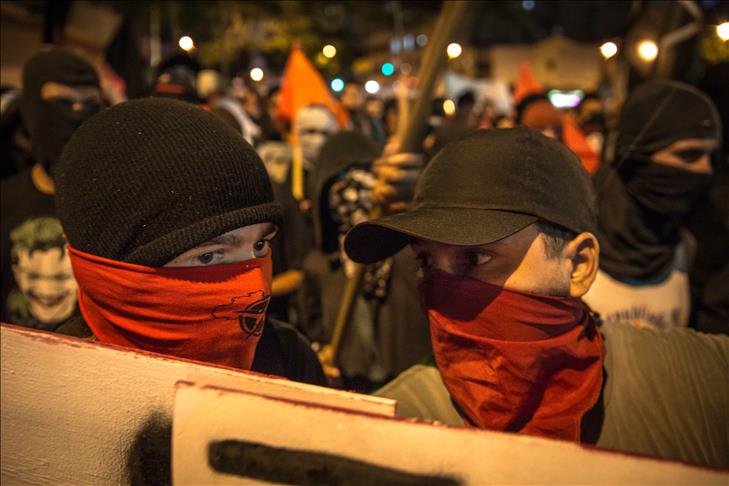
By Lucy Jordan
BRASILIA, Brazil
A series of racist incidents at World Cup matches is casting a shadow over an otherwise successful tournament.
On Saturday, at the Germany-Ghana game in Fortaleza, at least eight fans appeared to be wearing blackface. Match attendee Jason Spears, using the handle selma_slim, uploaded a photograph to Instagram of two men grinning, their faces covered in what appeared to be black shoe polish, wearing white t-shirts with “Ghana” crudely scrawled on them.
“So far I've counted 8 Germans in blackface. Worst, people are lining up to take pictures with them. Poor form, #Germany. #racism #racists #worldcup,” Spears wrote underneath. During the same game, a shirtless man with Nazi markings all over his torso – including “HH,” referring to “Heil Hitler” – ran onto the field. Earlier in the tournament, Rio de Janeiro police arrested two Argentinians at the Maracana stadium for allegedly calling Brazilian supporters "little monkeys."
The incidents speak to an enduring problem in both international football and Brazil, says Mauricio Savarese, Brazilian football writer and co-author of the recently-released A to Zico: An Alphabet of Brazilian Football.
“Historically, [racism] was a problem in Brazil,” said Savarese. “As far as I can remember we’ve never had blackface in the stands, but we have had black players using rice powder to lighten their skin.”
Savarese explained that at the beginning of 20th century, football was considered a game for white elites. Fearing the reaction of upper class spectators, the first clubs to bring in black players applied pale rice powder to their new team members to create a whiter look.
“Racism is much slighter now, and more difficult to detect,” Savarese said. “One kind of racism that exists now is that pundits tend not to call black players ‘brilliant’, or the ‘brains’ of the team. Even with someone like Pele, black players are seen as powerful athletes, but never the brains.”
Race is a complicated and contentious issue in Brazil, where more than half of the population declare themselves to be of African origin.
With a long history of interracial marriages, many in Brazil claim that theirs is not a racist society. But clear social and class divisions exist alongside racial lines in Brazil, with blacks significantly under-represented in prestigious universities and among high-status professions.
“Brazilians are friendly, but I feel some reserve from them, and I think it’s probably because I am black,” said Mary Kamga, 57, from Douala, Cameroon, who was queuing to enter Brasilia’s Mane Garrincha stadium ahead of Monday’s Brazil-Cameroon match. “We are staying in a very nice hotel, and I just feel like they are thinking, ‘what are they doing here, they don’t deserve to be here.’”
During the World Cup, many have commented on the fact that Brazilian fans watching games in the stadium seem to have been overwhelmingly white. “When I look around here I only see white people,” said Cindy Chungong, 27, originally from Cameroon, outside Brasilia’s stadium on Monday. “It’s clearly not representative of the country as a whole.”
Even so, racism in football is a bigger problem in some of the European clubs, Savarese said. “Comparing Brazil to Spain, or Russia, players tell me it is much more difficult in other nations than here,” he said. “Roberto Carlos, one of the best left-backs in the history of Real Madrid, was abused by supporters in Spain, while Ronaldo was abused at AC Milan.”
FIFA has promised to investigate how stewards allowed German to enter the stadiums while allegedly using blackface. But Savarese says that more important than keeping out individual antagonists are policies to tackle racism in football as a whole. “There are lots of things FIFA could do to punish teams and hold fans accountable,” he said, citing the example of Brazilian team Corinthians, which lost the right to hold home ground matches after fans became too rowdy. “Policies like that work much better than just expecting an average steward to be the judge of what constitutes racism in the stadium.”
Anadolu Agency website contains only a portion of the news stories offered to subscribers in the AA News Broadcasting System (HAS), and in summarized form. Please contact us for subscription options.

